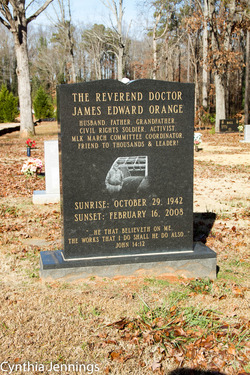When he answered death’s call aged 65 on Feb. 16, 2008 following gallbladder surgery, notable civil rights leader, James Orange, was rest assured, his name and contribution to the Black cause will be remembered.
Orange first joined a civil rights march to woo a lady before dying as one of its most notable faces.
And true to form, the native Alabamian who died in Atlanta is regarded as the one whose arrest in 1965 led to a series of events which culminated in President Lyndon Johnson signing the Voting Rights Act into law in August 1965.
He was charged for disorderly conduct and for enlisting students to aid in voting rights drives by the police. When news broke out that he was about to be lynched in the Perry County jail in Alabama it sparked uproar.

When news spread like wild fire that Orange would be lynched, civil rights activists organized a march to support him. However, the marchers clashed with Alabama state troopers during the February 18 demonstration, and a young black man, Jimmie Lee Jackson, was shot in the stomach.
The needless death of Jackson, 26, fueled anger and led civil rights leaders, including Rev. Martin Luther King Jr., to organize the Selma-to-Montgomery, Alabama, voting rights march which was broken up by club-wielding state troopers and sheriff’s deputies, resulting in “Bloody Sunday.”
Of the day, Orange submitted: “Jimmie’s death is the reason that Bloody Sunday took place, had he not died, there would never have been a Bloody Sunday.” On the marchers’ third attempt, in March, they made it to Montgomery.
Orange (1942-2008) was a noted civil rights activist in the 1960s who participated in numerous civil rights events with the Southern Christian Leadership Conference (SCLC) and the Alabama Christian Movement for Human Rights (ACMHR). These activities included the 1963 Birmingham Campaign, the SCLC’s Poor People’s Campaign, and the 1968 Sanitation Workers’ Strike in Memphis, Tennessee, where King Jr. was assassinated. Orange was at the Lorraine Motel speaking with King on the balcony above when the prominent civil rights leader was shot on April 4, 1968.

Orange eventually left his position as a SCLC project coordinator but continued to participate in human rights campaigns, championing labor activism and issues of racial prejudice until his death.
The Birmingham Campaign in 1963, where Orange joined the so-called “children’s crusade” protest in Birmingham, Alabama, which saw civil rights demonstrators brave police dogs and water cannon turned what might have been a defeat for King’s movement into a resounding victory.
He was born to Calvin and Ida Robinson Orange in Birmingham, Jefferson County; as the third of seven children. His parents were civil rights and labor activists for much of his early life.
When the SCLC and the ACMHR began their 1962 campaign to desegregate downtown Birmingham businesses, Orange was working as a chef at a local restaurant when King’s Southern Christian Leadership Conference came to town for a recruitment drive.
As the SCLC and ACMHR campaign developed, Orange joined the SCLC staff as a project coordinator engaged in youth outreach. In 1967, Orange was ordained as a Baptist minister. As part of his nonviolent approach in undertaking protest, Orange set out to recruit gang members to ditch their violent ways and join the SCLC.

Orange remained with the SCLC for nine years before resigning from his position in 1977 to become a regional coordinator for the American Federation of Labor and Congress of Industrial Organizations (AFL-CIO). Based in Atlanta, Georgia, Orange organized campaigns that won union representation and benefits for J. P. Stevens textile workers there.
The 1990s marked a particularly busy time for Orange as he participated in a wide variety of civil rights and labor rights movements including taking on Georgia Republican and Speaker of the House Newt Gingrich in Marietta as well as fighting against apartheid in South Africa. He also promoted trade between the United States and South Africa. Orange remained active in the organization as chairman until his death.

The black American civil rights campaigner was believed to have been arrested more than 100 times on demonstrations. Despite being a large man, 6ft 3in and well over 20 stone, Orange became a convert to non-violence and endured nine severe beatings rather than respond with violence.
In 2006, he championed the cause of Cynthia McKinney, former congresswoman who filed impeachment proceedings against President Bush over the Iraq war.
Orange told an interviewer: “We’ve made ‘solidarity’ our way of life,” adding “not only within the labour movement but between the labour movement and the African-American community.”
Orange left behind wife Cleophas, known as Cleo and five children.
His funeral was held in Morehouse College’s King Chapel in Atlanta and was buried in the city’s Greenwood Cemetery.










